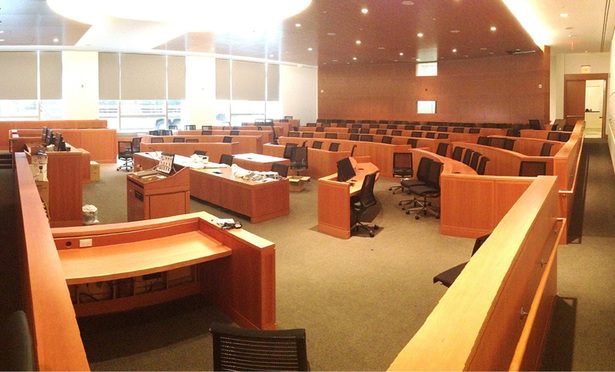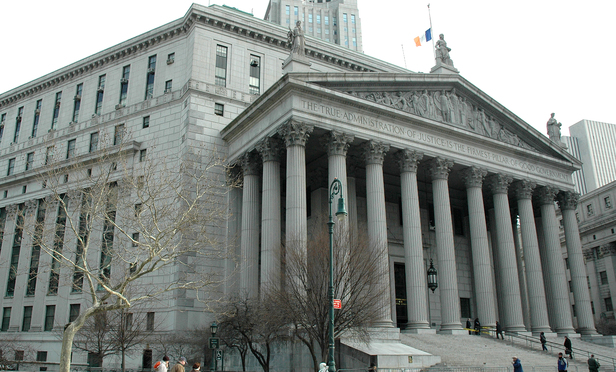Danielle C Lesser

July 22, 2022 | New York Law Journal
Practical Tidbits on the Rebuttal Appellate ArgumentThe rebuttal argument is a highly useful opportunity to address the concerns of the panel as well as rebut the arguments of your adversary.
By David B. Saxe and Danielle C. Lesser
6 minute read

July 13, 2020 | Law.com
New York Court Allows J.Crew to Shutter Under Terms of Mall Lease Despite Continuous Operations ProvisionMalls across America, long suffering even before the rise of COVID-19, are now forced to confront a wave of store closures. Troubled retailers will, without doubt, seek to close their failing mall locations. To stem these efforts, landlords have applied to courts for injunctive relief to force stores to remain open and operating, despite lagging sales, through the enforcement of the "continuous operations provision" found in mall leases.
By Danielle C. Lesser
5 minute read

April 05, 2019 | New York Law Journal
Moot Court Is Not Just for Law StudentsExtensive preparation for oral argument with the assistance of skilled moot court preparation, will give you the confidence and the experience to tackle the hard questions and facilitate your effort to persuade an undecided appellate panel. It can be all the difference between winning and losing.
By David B. Saxe and Danielle C. Lesser
8 minute read

August 20, 2018 | New York Law Journal
From 'Nomura' to 'Ambac': Where Does the Law on Sole Remedy Clauses Stand?Plaintiffs Ambac Assurance Corp. and others (collectively, Ambac), an insurer, sought to use contractual remedies other than the sole remedies clause in connection with its claim that defendants Countrywide Home Loans, Inc. and others, (collectively, Countrywide) breached various representations and warranties contained in the insurance and indemnity agreements (the I&I agreements) between the parties.
By David B. Saxe, Danielle C. Lesser and Michael Mix
8 minute read

May 29, 2018 | New York Law Journal
The Ancient Common Law Faithless Servant Rule: Still Relevant in New YorkThe doctrine that faithless servants paid on a “task-by-task” basis need only to forfeit their salary relating to disloyal activities initially developed in federal courts interpreting New York law.
By David B. Saxe and Danielle C. Lesser
15 minute read

March 20, 2018 | New York Law Journal
Goodbye 'Yellowstone' Road: Is This the End of the 'Yellowstone' Doctrine?David Saxe and Danielle Lesser discuss '159 MP Corp. v. Redbridge Bedford,' a case in which the Appellate Division, Second Department acknowledged that commercial landlords may employ a strategy that prevents tenants from exercising Yellowstone rights.
By David B. Saxe and Danielle C. Lesser
12 minute read

January 25, 2018 | New York Law Journal
Supersizing the Commercial Division: Is It a Good Idea?David B. Saxe and Danielle C. Lesser write: A meal can be supersized at McDonald's, but should New York County's Supreme Court, Commercial Division be supersized as well?
By David B. Saxe and Danielle C. Lesser
9 minute read

January 02, 2018 | New York Law Journal
Court of Appeals Revisits the Doctrine of Anticipatory RepudiationDavid B. Saxe and Danielle C. Lesser write discuss 'Princes Point v. Muss Dev.', in which the Court of Appeals found that a prospective purchaser's commencement of an action seeking to rescind an amendment to a purchase agreement one month prior to the last day to close on the purchase did not constitute an unequivocal communication to the seller of the purchaser's intention not to perform. The result is a detour into an area of murky jurisprudence that may prove unsettling to the commercial bar that relies on the certainty of precedent and its application in a way that conforms to the realities of commercial practice.
By David B. Saxe and Danielle C. Lesser
15 minute read
October 18, 2017 | New York Law Journal
Loss Causation in Securities Fraud CasesDavid B. Saxe and Danielle C. Lesser discuss the First Department's review of Commercial Division cases, specifically cases addressing the issue of loss causation in the securities fraud context.
By David B. Saxe and Danielle C. Lesser
21 minute read

August 04, 2017 | New York Law Journal
Broader Use of Special Masters: A ProposalFederal judges have the authority to appoint a special master, without the parties' consent, to be paid by the parties, to "address pretrial and posttrial matters that cannot be effectively and timely addressed by an available district judge or magistrate judge of the district." We believe that such a rule ought to be adopted in our state civil practice, especially in matters involving complex commercial litigation.
By David B. Saxe and Danielle C. Lesser
6 minute read
Trending Stories
- 1Parties’ Reservation of Rights Defeats Attempt to Enforce Settlement in Principle
- 2ACC CLO Survey Waves Warning Flags for Boards
- 3States Accuse Trump of Thwarting Court's Funding Restoration Order
- 4Microsoft Becomes Latest Tech Company to Face Claims of Stealing Marketing Commissions From Influencers
- 5Coral Gables Attorney Busted for Stalking Lawyer



